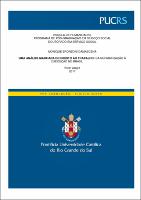| Compartilhe o registro |


|
Use este identificador para citar ou linkar para este item:
https://tede2.pucrs.br/tede2/handle/tede/8076| Tipo do documento: | Tese |
| Título: | Uma análise marxiana do direito ao trabalho : da normatização à execução no Brasil |
| Autor: | Damascena, Monique Bronzoni  |
| Primeiro orientador: | Reis, Carlos Nelson dos |
| Resumo: | O trabalho é incorporado à sociedade de mercado como meio de acúmulo de riquezas, e toda a estrutura social está direcionada às relações sociais criadas e recriadas sobre o sistema econômico capitalista. Diante disso, o direito ao trabalho no Brasil tem sido determinado pelo conjunto dessa relação com a estrutura de sociedade do sistema econômico. Para explicar esse fenômeno social, o estudo propôs-se à realização de uma análise marxiana, com grau de importância no método dialético-crítico. Com o estudo foi possível explicar, a partir da essência do trabalho, a sua constituição como riqueza para o sistema econômico, sua normatização como direito social e sua ação por meio das políticas sociais que visam à inclusão produtiva. Para tal, o tipo de pesquisa realizada foi a bibliográfica, com abordagem quanti-qualitativa, através do levantamento de produções acadêmicas sobre o tema. Disso, abstraem-se algumas conclusões: a) a essência do trabalho foi apartada do ser social, o que deixou em profunda desvantagem o desenvolvimento da personalidade humana em benefício dos valores do trabalho abstrato; b) o trabalho que gera acúmulo de riquezas diretamente é o trabalho produtivo e indiretamente o improdutivo; c) o direito ao trabalho no seu sentido ampliado é garantido parcialmente; d) a garantia do trabalho como direito social não é sobreposto ao da acumulação de riquezas; e) a normatização do direito ao trabalho no Brasil está essencialmente pautada nas relações de trabalho assalariado (direito do trabalho); f) o Estado oferece como direito ao trabalho as mínimas condições para a execução do trabalho abstrato e produtivo, e as mínimas condições de sobrevivência e consumo para as demais classes econômicas de trabalhadores; g) as ações que visam o direito ao trabalho, no âmbito coletivo e da promoção social, estão garantidas em leis infraconstitucionais e em ações de programas de governo, com enfoque na qualificação profissional; h) as ações de inclusão produtiva são insuficientes para garantir as condições mínimas de sobrevivência e não asseguram a diminuição da desigualdade de renda e social. Diante dessas conclusões, propôs-se como resistência a esse contexto, a apreensão dos pontos limites do Estado, do Direito e do direito ao trabalho. Esses limites apontam as fronteiras que podem ser exploradas por processos realmente revolucionários dentro da sociedade de mercado, apresentados, a partir da dimensão ideológica hegemônica, como ilegítimos, ilegais e injustos. |
| Abstract: | The labor is incorporated into the market society as a manner to accumulate wealth and, accordingly, all the social structure is oriented to the social relationships which arise from the capitalist system. As a consequence, the right to work in Brazil has been regulated by the mutual interaction between such social relation and the social structure of the economic system. Attempting to explain this social phenomenon, this thesis aims to realize a Marxian analysis on it, utilizing to do so the dialectic-critic method. After bringing the essence of the labor into the picture, the study was able to explain how the labor constitutes itself as wealth to the economic system, its regulation as a social right, and its execution through social programs focused on the productive inclusion. The performed analysis was based on quantitative-qualitative bibliography research, which included several academic works on the subject. From such analysis, some conclusions can be inferred: a) the essence of the labor was kept apart from the social being, thereby benefiting the values of the abstract labor but imposing to the human personality development a considerable disadvantage. b) the type of labor which is capable of generating wealth directly is the productive labor, whereas the one which generates it indirectly is the unproductive labor. c) the right to work, considering its wider sense, is partially guaranteed. d) the guarantee of having labor as a social right does not impose itself on the right of accumulate wealth. e) the right to work regulation in Brazil is mainly determined by relations involving paid employment (labor right). f) the right of work provided by the state offers minimal conditions for labor, subsistence, and consumption. g) the actions related to the right of work, at the collective level and aiming social promotion, are guaranteed in laws and government programs oriented to professional qualification. h) the actions of productive inclusion are not sufficient to guarantee minimal conditions of subsistence and they do not ensure the reduction of social and income inequality. After facing such conclusions, this work suggests as resistive measures to this context, the understanding of the limits of the state, the government, and the right to work. These limits point out new frontiers that might be explored by revolutionary processes within the market society, which are typically presented as illegitimate, illegal, or even unfair. |
| Palavras-chave: | Direito ao Trabalho Análise Marxiana Inclusão Produtiva Brasil |
| Área(s) do CNPq: | CIENCIAS SOCIAIS APLICADAS::SERVICO SOCIAL |
| Idioma: | por |
| País: | Brasil |
| Instituição: | Pontifícia Universidade Católica do Rio Grande do Sul |
| Sigla da instituição: | PUCRS |
| Departamento: | Escola de Humanidades |
| Programa: | Programa de Pós-Graduação em Serviço Social |
| Tipo de acesso: | Acesso Aberto |
| Restrição de acesso: | Trabalho não apresenta restrição para publicação |
| URI: | http://tede2.pucrs.br/tede2/handle/tede/8076 |
| Data de defesa: | 29-Mar-2017 |
| Aparece nas coleções: | Programa de Pós-Graduação em Serviço Social |
Arquivos associados a este item:
| Arquivo | Descrição | Tamanho | Formato | |
|---|---|---|---|---|
| Tese - Monique Bronzoni Damascena.pdf | MONIQUE_BRONZONI_DAMASCENA_TES | 2,31 MB | Adobe PDF |  Baixar/Abrir Pré-Visualizar |
Os itens no repositório estão protegidos por copyright, com todos os direitos reservados, salvo quando é indicado o contrário.




